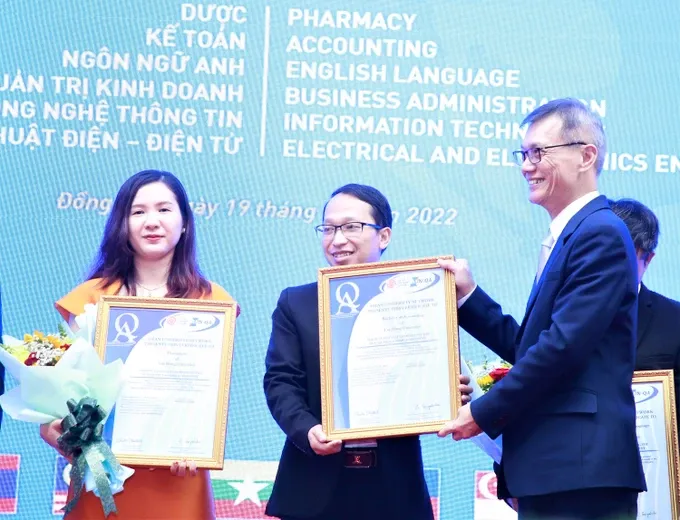
Prof Dr Huynh Van Chuong, Director of the Department of Quality Assurance (under the Ministry of Education and Training - MoET) informed that the quality assessment standards in Circular 04/2016/TT-BGDDT dated March 14, 2016 were based on the 3.0 version of the program assessment standards of the ASEAN University Network Quality Assurance (AUNQA).
As AUNQA has upgraded its assessment standards to a new version (4.0), Vietnam needs to update accordingly to both suit the domestic context and ensure international and regional integration, especially as the MoET develops a reference report on the Vietnamese Qualifications Framework aligned with the ASEAN Qualifications Framework and revises and supplements the national qualifications framework in the 2024-2025 academic year.
The draft amendment has integrated specialized guidance and forms into the accompanying annexes. The set of standards in the draft consists of 8 standards (instead of 11 in Circular 04 above), 52 criteria, along with an annex on guidance for assessing criteria and an annex of necessary forms. This has eliminated overlaps in the assessment process under the current circular.
The draft also stipulates 10 conditional criteria, which are mandatory criteria for a training program to meet quality standards. This regulation is suitable for the current context and the status of program development in Vietnam while being compliant with international practices on quality assurance.
According to the regulations in Circular 04, the assessment of criteria includes 7 levels from 1 to 7, while the draft currently offers only 2 levels (pass/fail). The approach of assessing criteria at 7 levels is not common in quality assurance in many countries and international assessment organizations.
Vietnamese higher education institutions have undergone accreditation up to the second cycle and have about 10 years of experience in implementing higher education quality assurance activities, so it is necessary to adjust the assessment method correspondingly.
MoET’s Department of Higher Education affirmed that the draft supplements regulations to expand the authority of the assessment organization in developing external assessment tools as long as they observe the applicable Law on Education and Law on Higher Education.
Based on the framework of 8 standards and 52 criteria for assessing training institutions issued by the MoET, assessment organizations build specialized guidance, integrated criteria for assessing training programs in specific specialized fields as prescribed by the Government.
Another noticeable point is the draft’s content about the form of assessment, the number and composition of the external evaluation team, the council meetings, duties of the team leader and secretary as well as each team member, and the digitalization of evidence, which are in line with the development trend and the requirement to apply IT to educational quality assurance activities.
More importantly, the draft also clearly stipulates the responsibilities of training institutions in committing to ensuring the maintenance of the program, self-assessing the achievement of training program standards, and reducing administrative burdens for assessors to implement the true spirit of quality assurance – to provide advice and support.
The Vietnam National Institute of Educational Sciences – an organization specializing in consulting, cooperating, researching, and applying research results in the field of education and software technology for education – commented that one of the notable new points is that the draft has added a “conditional pass” assessment level - allowing institutions a maximum of 18 months to improve the quality of some standards and criteria that have not met the assessment requirements. This time, according to educational experts, is sufficient for training institutions to fulfill those tasks.
In addition, for training programs that are assessed as meeting the standards from the second cycle onwards and have quality improvement results that meet the requirements according to the results of the previous assessment cycle, the next quality assurance period for the training program is 7 years – extended by 2 years compared to the current regulations.
The results of the quality assessment analysis of more than 1,200 training programs assessed according to domestic standards from 2017 to the present show that the unmet criteria (below 4 points) are mainly related to the design, development, and evaluation of the program.
This also shows that building training programs that meet training outcomes and assessing learners, taking feedback from stakeholders to serve the improvement of training program quality are weaknesses that need to be regulated for institutions to pay attention to.
























